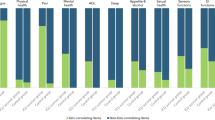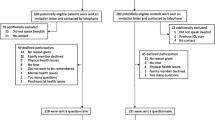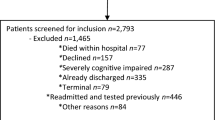Abstract
Objectives
The objective of our study was to compare advantages and limitations of two generic Quality of Life questionnaires administered in older inpatients.
Design
Two validated generic health-related Quality of Life instruments: the MOS Short-Form 36 (9 dimensions, 36 items) and the Duke Health Profile (6 dimensions, 4 dysfunctions, 17 items) were administered to inpatients over 65 years.
Setting and participants
The sample was drawn from the CliniQualVie program that assessed systematically Quality of Life among hospitalized inpatients (18–79 years) in 10 medical and surgical wards at Nancy University Hospital.
Results
The two self-administered questionnaires were completed by 701 patients over 65 years at admission (mean age 71±4, 63% men). The proportion of patients who completed all items were 72.5% for the Duke and 66.9% fo 9% for the 36 (p<.001). The Dukes’s internal consistency was low as compared with the SF-36, but other psychometric properties were comparable. Good correlations (Spearman) were observed between the two questionnaires for physical health (0.59, p<.0001), mental health (0.68, p<.0001) and health perception (0.56, p<.0001) scores. Low correlations were observed for the social score.
Conclusions
This is the first study to our knowledge to assess the interest of using the Duke Health Profile in a general elderly inpatients population as compared with the SF-36 questionnaire. Although these two questionnaires have four comparable dimensions, they differ in their content and psychometric properties. The Duke questionnaire, due to its better completion rate and despite some psychometric limitations may be useful in this population, particularly in the more frail patients.
Similar content being viewed by others
References
Sanders C, Egger M, Donovan J, et al. Reporting on quality of life in randomised controlled trials: bibliographic study. BMJ 1998;317: 1191–1194.
Garratt A, Schmidt L, Mackintosh A, et al. Quality of life measurement: bibliographic study of patient assessed health outcome measures. BMJ. 2002;324: 1417.
Haywood KL, Garratt AM, Fitzpatrick R. Quality of life in older people: a structured review of generic self-assessed health instruments. Qual Life Res 2005;14:1651–1668.
Briançon S, Gergonne B, Guillemin F, et al. Disease-specific versus generic measurement of Health Related Quality of Life in cross-sectional and longitudinal studies: an inpatient investigation of the SF-36 and four disease-specific instruments. In: Mesbah M, Cole BF, Ting Lee ML, eds. Statistical methods for quality of life studies. Design, measurements and analysis. Dordrecht: Kluwer. 2002;87–100.
Charlson ME, Pompei P, Ales KL, et al. A new method of classifying prognostic comorbidity in longitudinal studies: development and validation. J Chron Dis 1987;40: 373–383.
Ware MA, Sherbourne CD. The MOS 36-Item Short-Form Health Survey (SF-36). I. Conceptual framework and item selection. Med Care 1992;30: 473–483.
Parkerson GR, Broadhead WE, Tse CK. The Duke Health Profile: a 17 item measure of health and dysfunction. Med Care 1990;28: 1056–1072.
Leplège A, Mesbah M, Marquis P. Preliminary analysis of the psychometric properties of the French version of an international questionnaire measuring the quality of life: the MOS SF-36 (version 1.1). Rev Epidemiol Sante Pub 1995;43: 371–379.
Guillemin F, Paul-Dauphin A, Virion JM, et al. [The DUKE health profile: a generic instrument to measure the quality of life tied to health]. Sante Publique 1997;9: 35–44.
Hyland ME. A brief guide to the selection of quality of life instrument. Health Qual Life 2003;1: 24.
Cronbach L. Coefficient alpha and the internal structure of tests. Psychometrika 1951;16: 297–334.
Nunnally JC, Bernstein IR. Psychometric Theory, 3rd Ed. New-York: McGraw-Hill; 1994.
Fayers PM, Machin D. Quality of life: Assessment, Analysis and Interpretation. Chichester: John Wiley and Sons; 2000.
Campbell DT, Fiske DW. Convergent and discriminant validation by the multitraitmultimethod matrix. Psychol Bull 1959;56: 81.
Parkerson GR, Broadhead WE, Tse CK. Comparison of the Duke Health Profile and the MOS Short-Form in healthy young adults. Med Care 1991;29: 679–683.
Osborne RH, Hawthorne G, Lew EA, et al. Quality of life assessment in the community-dwelling elderly: validation of the Assessment of Quality of Life (AqoL) instrument and comparison with the SF-36. J Clin Epidemiol 2003;56: 138–47.
Novella J, Ankri J, Morrone I, et al. Evaluation of the quality of life in dementia with a generic quality of life questionnaire: the Duke Health Profile. Dement Geriatr Cogn Disord 2001;12: 158–166.
Coste J, Walter E, Venot A. A new approach to selection and weighting of items in evaluative composite measurement scales. Stat Med 1995;14: 2565–2580.
Gandeck B, Sinclair SJ, Kosinski M, et al. Psychometric evaluation of the SF-36 health survey in Medicare managed care. Health Care Financ Rev 2004;25: 5–25.
Andresen EM, Bowley N, Rothenberg BM, et al. Test-retest performance of a mailed version of the Medical Outcomes Study 36-item Short-Form Health Survey among older adults. Med Care 1996;34: 1165–1170.
Walters SJ, Munro JF, Brazier JE. Using the SF-36 with older adults: a crosssectional community-based survey. Age Ageing 2001;30: 337–343.
Parker SG, Peet SM, Jagger C, et al. Measuring health status in older patients. The SF-36 in practice. Age Ageing 1998;27: 13–18.
Hill S, Harries U, Popay J. Is the short form 36 (SF-36) suitable for routine health outcomes assessment in health care for older people? Evidence from preliminary work in community based health services in England. J Epidemiol Community Health 1996;50: 94–98.
Stadnyk K, Calder J, Rockwood K. Testing the measurement properties of the Short Form-36 Health Survey in a frail elderly population. J Clin Epidemiol 1998;51: 827–835.
Guillemin F, Virion JM, Escudier P, et al. Effect on ostearthritis of spa therapy at Bourbonne-les-Bains. Joint Bone Spine 2001;68: 499–503.
Chen AL, Broadhead WE, Doe EA, et al. Patient acceptance of two health status measures: the Medical Outcomes Study Short-Form General Health Survey and the Duke Health Profile. Fam Med 1993;25: 536–539.
Haywood KL, Garratt AM, Fitzpatrick R. Older people specific health status and quality of life: a structured review of self-assessed instruments. J Eval Clin Pract 2005;11:315–27.
Power M, Quinn K, Schmidt S, WHOQOL-OLD group. Development of the WHOQOL-OLD module. Qual Life Res. 2005;14:2197–214.
Author information
Authors and Affiliations
Corresponding author
Rights and permissions
About this article
Cite this article
Perret-Guillaume, C., Briancon, S., Guillemin, F. et al. Which generic health related quality of life questionnaire should be used in older inpatients: Comparison of the duke health profile and the MOS short-form SF-36?. J Nutr Health Aging 14, 325–331 (2010). https://doi.org/10.1007/s12603-010-0074-1
Received:
Accepted:
Published:
Issue Date:
DOI: https://doi.org/10.1007/s12603-010-0074-1




